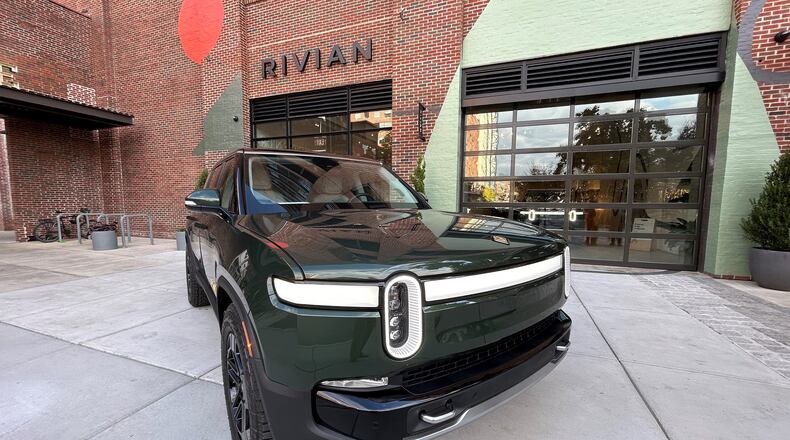Editor’s note: This story has been updated with Rivian’s first quarter production and delivery numbers announced Wednesday morning.
The CEO of electric vehicle maker Rivian told Bloomberg on Tuesday that he and leaders of other automakers are waiting to see how “the dust settles” from the latest round of tariff announcements expected to come Wednesday from President Donald Trump — as well as how leaders of other nations respond.
And the “dynamic environment” of the trade disruptions could mean “our production footprint may be different than what we were initially planning,” Rivian Chief Executive RJ Scaringe said.
“We’re spending a lot of time interpreting and understanding what the tariff implications are for us of course in the United States but importantly recognizing that in particular Europe may respond,” Scaringe said.
Rivian operates a factory in Illinois and is planning another an hour east of Atlanta.
A Rivian spokesperson did not immediately respond to a request for more information Tuesday from The Atlanta Journal-Constitution about how Rivian’s “production footprint” planning might change.
Credit: TNS
Credit: TNS
On Wednesday afternoon, Trump is expected to announce his plans for reciprocal tariffs on countries with tariffs or high trade barriers on U.S. goods. The administration has hinted it could instead levy across-the-board tariffs on all foreign goods.
On Thursday, the U.S. is also expected to start collecting 25% tariffs on foreign automobiles and eventually on foreign auto parts. These tariffs are on top of 25% tariffs on foreign steel and aluminum and other levies targeting major trading partners.
Foreign leaders have been preparing or implementing their own countermeasures against U.S. products.
Trump has said tariffs on autos will push more domestic customers to buy American and prod foreign brands to produce more vehicles in the U.S. and employ more workers. Last week, Hyundai Motor Group announced plans to invest $21 billion over the next four years in the U.S., including expanding vehicle production at its plants in Alabama and Georgia and construction of a steel factory in Louisiana.
California-based Rivian, maker of the R1S SUV, R1T truck and an electric delivery van, assembles all its vehicles at a factory in Illinois. The company is currently expanding that plant in preparation for its next model launch.
Rivian’s future two-row R2 SUV, which will start production in Illinois in 2026, is a vehicle it hopes to sell not only in the U.S. but overseas.
The R2’s success is important for Rivian’s Georgia plans. The future $5 billion factory in southern Morgan and Walton counties is where Scaringe has said the company will expand production of the R2 and build two other smaller models that could appeal to U.S. and foreign EV buyers — the R3 and R3X.
“How ultimately the tariff structure sets out and lays out is going to have a big impact on some of the decisions we make over the next year,” Scaringe said in the interview. He said Rivian is closely monitoring plans announced by the White House and international reaction, all of which he called “a very dynamic situation.”
“And I think some of the uncertainty makes it the most challenging to navigate,” he said.
Potential new tariffs on U.S. autos by the European Union and other nations would make American vehicles more expensive overseas. Tariffs the U.S. slaps on foreign parts will also raise costs for U.S. automakers.
Cox Automotive Chief Economist Jonathan Smoke estimated last week that tariffs on Mexican and Canadian auto parts would add about $3,000 to the price of vehicles built in the U.S. The average price of cars made in Mexico and Canada, for instance, are expected to increase by $6,000. Price increases would slam the brakes on new car sales that have been slow to recover from the COVID-19 pandemic’s economic upheaval, he said.
Cox Enterprises, the owner of the AJC and Cox Automotive, also owns a 3% stake in Rivian.
On Wednesday, Rivian announced it built 14,611 EVs and delivered 8,640 units to customers in the first three months of the year, in line with previous guidance. The company also reaffirmed its guidance that it will deliver 46,000 to 51,000 vehicles in 2025.
Manufacturing and economic challenges have slowed Rivian’s growth. Last year, the company, which has yet to have a profitable quarter, put on pause its Georgia factory plans in a bid to save money.
Credit: Courtesy Rivian
Credit: Courtesy Rivian
But after striking a multibillion-dollar joint venture partnership with Volkswagen and receiving approval for a $6.6 billion loan from the Biden administration in January, the company has said it plans to begin construction of the factory near Social Circle next year, with EV production starting there in 2028.
Scaringe has said the company will meet its goals to invest $5 billion and hire 7,500 workers in Georgia by the end of the decade.
Scaringe told Bloomberg Rivian employs about 17,000 people in the U.S.
“We are growing rapidly in the United States,” he said. “One hundred percent of our vehicles today are produced here, and all of our technology is here.
“In terms of the administration’s objectives, we’re very aligned with what’s being asked and what I think the overall policy framework is trying to driving towards,” Scaringe said. “But in terms of how that translates to our expansion in Europe and elsewhere, we do have to recognize it’s a very dynamic environment, our production footprint may be different than what we were initially planning. But I think all of us, across all different automotive manufacturers are waiting to see how things look once the dust settles.”
About the Author
Keep Reading
The Latest
Featured






